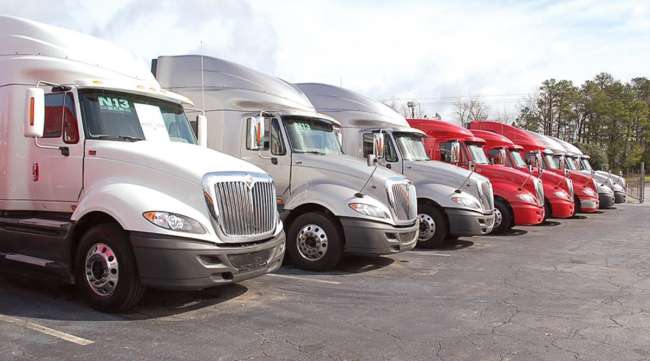Senior Reporter
Year-Over-Year Average Price for Used Class 8 Trucks Drops Again

[Stay on top of transportation news: Get TTNews in your inbox.]
The year-over-year average price of a used Class 8 vehicle in June added another link to the chain of declines that now extends to 14 consecutive months, but the month’s less-steep slide also generated some sense that conditions are improving, ACT Research reported.
The average price fell 10.2% to $36,519 compared with $40,687 a year earlier, according to ACT. Prices in April fell 22% and 15% in May.
One analyst said the level of price decline was a cautious sign of improving conditions.

Tam
“We are becoming less negative as we transition through the year,” ACT Vice President Steve Tam said. “Part of that is easier price comparisons, which was the expectation given the price curve we were dealt last year. From that perspective, things are playing out a little bit sooner and with a quicker recovery, adding to cautious optimism.”
Sales in June reached 18,000, up from 16,400 in May, but down from 19,500 in the 2019 period.
Each month, ACT surveys a sample of dealers, wholesalers and auctioneers as well as a few large fleets to determine average price, age and mileage, and estimated industry volumes.
“[On a year-to-date basis,] we have obviously lost some traction,” Tam said. Sales were 104,200 compared with 124,000 in the 2019 period, and a lot of that is because of the direct hit the country took in the in April-May time frame, he said.
“Now, all throughout the economy, and in our industry and manufacturing, there seems to be almost this collective sigh of relief that the worst of the impact is in the rearview mirror, that we have dealt with the really bad stuff,” Tam said. “Not to say we are going to bounce back to pre-pandemic levels overnight. But a lot of different indicators suggest that we are certainly moving in that direction at this point.”
With where pricing is at and given there seems to be a little bit of a bolstering of confidence, certainly the dealers are back in the marketplace, Tam said.
“If I look at that portion of our data, both the wholesale and auction side transactions were quite strong,” he said. “Retail was, too, but we haven’t seen that kind of behavior on the dealer front.”
The average mileage was 462,000, basically flat from 463,000 a year earlier.
The average age was 6 years, 9 months, compared with 7 years, 8 months.
One fleet executive agreed used truck sales were improving, but pricing still lagged.

Ragan
“So it has picked up,” Melton Truck Lines Chief Financial Officer Robert Ragan told Transport Topics.
Melton sold 33 trucks in June, 36 in May and 17 in April, he said. In July, it’s closer to 50.
“We didn’t get the pricing that we certainly have the last couple of years. [The trucks] are down a little over 10% on the average price year-over-year, somewhere in that neighborhood, but better than they were in April and May,” Ragan said.
Some were sold retail, but a lot were returned to the dealers where they were bought new, or sold to independent dealer networks.
“There are some truck leasing companies that buy some, so it’s a combination of retail and other,” he said.
The Tulsa, Okla.-based flatbed-heavy specialized carrier operates 1,450 tractors. Melton ranks No. 87 on the Transport Topics Top 100 list of the largest for-hire carriers in North America.

Transport Topics introduces its newest digital interview series, Newsmakers, aimed at helping leaders in trucking and freight transportation navigate turbulent times. Audience members will gain access to the industry's leading expert in their particular field and the thoughtful moderation of a Transport Topics journalist. Our second episode — "The Evolution of Electric Trucks" — featured Nikola founder and executive chairman Trevor Milton. To view the replay, complete this form.
“We have, like a lot of the bigger companies, a sister equipment company that buys the trucks from the truck makers and leases them to Melton, and Melton uses them for four years, and our equipment company sells them,” Ragan said.
Melton was scheduled to sell about 340 trucks in 2020 and add replacements, he said.
“Gosh, the first of April, I was thinking, we aren’t going to sell anywhere near that many, and if we did, we’d be giving them away for huge losses,” he said.
“I would define the overall market right now as it has bottomed in the May time frame, and it hasn’t bounced back with the sudden bounce we have seen in our freight volumes and freight rates,” Ragan added, “but bottomed and is ticking up ever so slightly to where we are doing better than what we thought we would in April.”
He said Melton was close to having its entire fleet outfitted with collision-mitigation systems and intends to start selling the oldest such trucks in a little more than a year.
“We are hopeful that will bring an increase in residual value,” Ragan said, “especially if you look at what has been going on in the insurance marketplace.”
Want more news? Listen to today's daily briefing:
Subscribe: Apple Podcasts | Spotify | Amazon Alexa | Google Assistant | More




